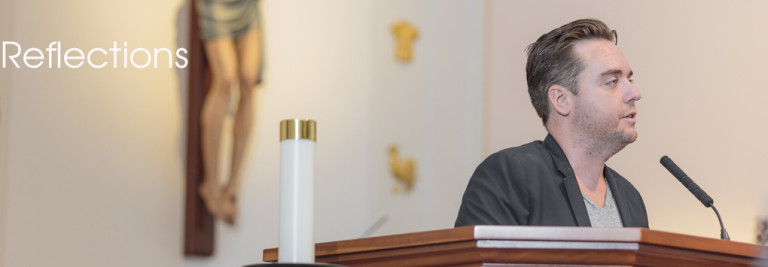My Confirmation name is Thomas. When asked by my Director of Religious Education why I chose the name, I said youthfully—which is to say, arrogantly—“Because I’m not sure if I believe in all this.” I have grown more certain in the decade and a half since my Confirmation, but I’m still a “doubting Thomas.” A proud one in fact. My friends who say they are atheist frustrate me; their arguments tend to be juvenile. Pouty at worst. “Believing in something you can’t see is crazy!” They say. I remind them I haven’t “seen” a million dollars in cash or the love we have for one another either, but that’s irrelevant. Or is it? Their atheism, like my faith, is informed by an experience.
Let’s think of this Sunday’s Gospel. I think Thomas, demanding to “see the mark of the nails in his hands and put [his] finger into the nail marks” (John 20:25), is a very human response. I imagine him saying these words not arrogantly, but heartbrokenly. In my imagination tears are flowing down his face, he is in such pain that he doesn’t want to hear words of hope. I know in the case of at least one friend, that is the case. Their belief is hindered by the horrific examples of “faithful” people close to them. Yet, what of us—what about us who do believe? Are we not to doubt?
“Faith is the assurance of things hoped for, the conviction of things not seen” (Hebrews 11:1), the writer of the Epistle to the Hebrews tells us. Faith, not belief. Belief demands proof; faith—something else. Faith is not belief; rather it is something closer to hope. Doubt isn’t the antithesis of faith, it is a part of it. The way I often explain it to my students is to give an everyday example: “I believe Barack Obama is the President, I have faith he’ll be a good one.” There’s a distinction that is easier understood than explained.
Jacques Maritain, the French philosopher, wrote about the difference between problems and solutions. Problems can be solved (what is the square root of something?), but mysteries have to be understood — almost felt (what is beauty?). Problems belong in the realm of belief; mysteries, in the realm of faith. Thomas was panicked, he was in the world of problems, he needed proof, his heartbreak and his panic (would the Roman authority come for the Apostles next?) clouded his faith.
Make no mistake: Doubt is scary — Will the bank approve the loan? Will she ever take me back? Will my daughter grow out of this phase? Did grandma really go to heaven? These are all very real concerns and if we ask ourselves these essential questions in a healthy way, they save us from righteousness, from our blind certainty. Doubt, a part of true faith, saves us from radical ideology. We can be sure but never one hundred percent sure—we always have doubt. So, perhaps in the end, our doubt, like our faith, ends up saving us. Happy Easter Season!
I’ll be seeing you,
Elliot



